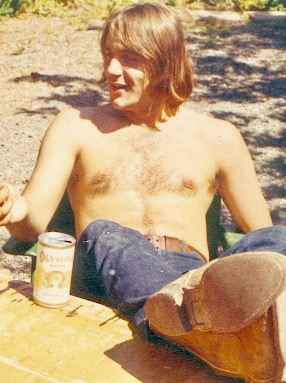Post written by Michael Millard – Navy Veteran



I enlisted in the Navy in 1965, just days after turning 18. While I had a romantic view of America and war, nurtured mostly by cheesy movies and TV shows about WWII, within months of leaving home my apprehension of the real world began to darken considerably.
I was assigned briefly to Lemoore Naval Air Station outside Fresno, California, and during a wild night of drinking in town I suffered some cracked ribs and a broken jaw when I took a beating from a carload of farm workers. I was sent to Oak Knoll Naval Hospital, hidden away in the Oakland hills, and placed with a few other broken jaws in an open ward that housed mostly plastic surgery patients, many of whom had been disfigured amid the conflict raging in Vietnam. We were all raw and callow, just out of high school, and life was essentially over for some of the young men in that long double row of beds that made up the ward. There were kids who’d been burned beyond recognition, some who had parts of their faces blown away, some had limbs missing as well. What would happen to these guys, I wondered, gazing silently around the ward after my jaw was wired up, still drowsy with the Demerol pain-killer the nurse had injected into my arm. How could the government do this to its youth? And more importantly, perhaps, why?
Although geopolitics was just a big word that was yet to become part of my vocabulary, I began to question not only the government but the war itself. It became apparent that the Vietnam War was not a virtuous conflict like WWII, in which my father had fought, or WWI, in which my grandfather participated. This destruction of lives seemed pointless and futile, and while pain-killers could alleviate my physical suffering, psychologically I endured an existential crisis, a loss of faith that continued to deepen throughout the years of my enlistment. I began to feel that any God who could allow this misery was not worthy of the name.
When I left the military, I made my way to the Haight- Ashbury neighborhood of San Francisco, along with many other veterans at that time, enrolled in City College and studied literature, philosophy and journalism. I had already made the acquaintance of entheogens and plant medicines, but in San Francisco I became deeply entwined with them. Living in a communal flat just off Haight Street, cannabis was smoked around the table on a daily basis, while mushrooms, peyote buttons or LSD were ingested at least once a week. I felt like I was making up for lost time. One experience in particular was so memorable that it remains with me still: On Ocean Beach, across from the Family Dog dancehall, in a state of entheogenic rapture I forgave an acquaintance a transgression and at that moment all the barriers fell away from my mind, allowing me to flow outward into an infinite awareness I had never known. It was a moment of eternity that also flowed through me as my boundaries dissolved in immeasurable love and the feminine Oneness of all natural life. I read later that this sort experience was sometimes called satori, a term derived from Japanese Buddhism.
From this awesome experience I began to heal, understanding at last that faith was unnecessary amid a mystical gnostic perception. Life was as it should be and I was a part of the Oneness that embraced us all. I went from City College to the University of Oregon and graduated in journalism, later to Syracuse for a master’s in international relations, embarking on a career with newspapers and wire services that would take me to Japan, throughout Asia and around the world, continuing to this day. Even now, I am often reminded of the time when light overcame darkness in San Francisco. I am better for it, and I am thankful, because it transformed my understanding of life.

Recent Comments